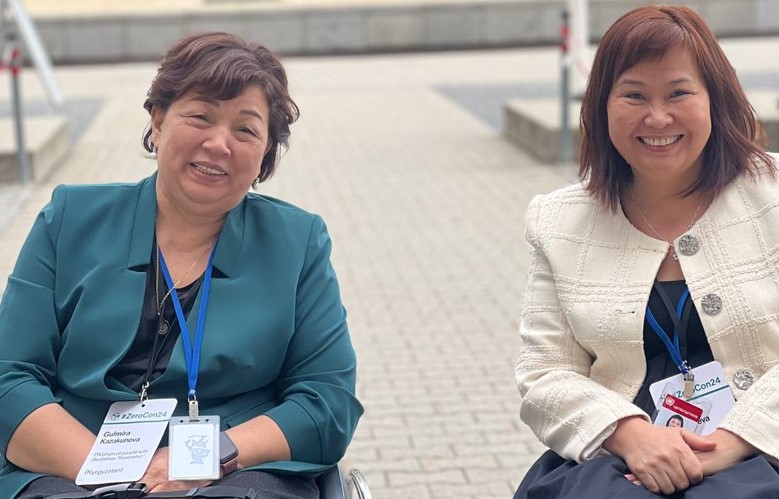More than 1 billion people, or 16 percent of the world’s population, experience a significant disability, and 80 percent to 90 percent of working age people with disabilities are unemployed in developing countries. People with disabilities are more likely to experience adverse socioeconomic outcomes than those without disabilities, such as under education, a higher drop-out rate, lower levels of professional integration and higher poverty levels.
In Central Asia, the Solidarity Center partners with disability rights groups to promote inclusive employment, including through inclusive education. Zakhira Begalieva and Gulmira Kazakunova, disability rights activists who head Kazakhstan’s I Teach Me and Kyrgyzstan’s Ravenstvo, respectively, last month joined more than 1,000 people from 100 countries in Vienna for the UN’s 2024 Project Zero Conference to learn more about Inclusive education and information and communication technology (ICT), and to explore regional and global alliance-building opportunities.
“Here you feel some kind of freedom and you feel that opportunities are not limited,” said Kazakunova.
In Kazakhstan, I Teach Me provides online training for youth with disabilities to prepare them for future employment and, in Kyrgyzstan, Ravenstvo educates women with disabilities to help them secure jobs and advocates for inclusive education to help increase job market participation for women with disabilities.
The UN Convention on the Rights of Persons with Disabilities (CRPD), which aims to create conditions for persons with disabilities to participate in society on an equal basis with others and free from discrimination, was ratified by Kazakhstan in 2015 and Kyrgyzstan in 2019. However, discrimination against people with disabilities has persisted.
In Kazakhstan, the UN Development Program (UNDP) reports that the country’s more than 750,000 people with disabilities every day, “face obstacles on the way to gaining equal access to education, health and employment.” The Solidarity Center in Kazakhstan is supporting partners who, after years of advocating for inclusivity, are now focused on implementation of new legislative measures and a legal framework adopted to ensure implementation of CRPD. Starting this year, more than 34,000 workers with disabilities were covered by measures to promote employment.
In Kyrgyzstan, the Solidarity Center is supporting a program focused on reducing discrimination in employment and promoting the labor rights of workers with disabilities—the first of its kind in the country. A 2022 Solidarity Center study revealed that only 20 percent of people with disabilities surveyed in Kyrgyzstan were employed, most in insecure seasonal or part-time jobs. Through a combination of legislative analysis, large-scale media campaigns, the development of a mobile application, individual legal support, educational trainings and collaboration with key organizations, the Solidarity Center is working to make real change for people with disabilities in Kyrgyzstan, including efforts to harmonize regulations and mechanisms in the country’s labor code to improve laws impacting people with disabilities.
Unions and other worker associations can be especially effective advocates for disability rights. The International Labor Organization (ILO) reports that unions are the strongest voices advocating for the rights of people with disabilities at work around the world. Public-sector unions, where survey data shows workers with disabilities experience higher levels of union representation, are natural organizers around rights issues because of their position at the nexus of governance and work.
Learn more about strategies that civil society allies in Kyrgyzstan, with Solidarity Center support, are using to advance and protect the rights of people with disabilities—including coalition-building and joint advocacy projects with national and local disability rights organizations, pro-bono legal support, data collection, legislative reform and trainings-of-trainers with disabilities. [Video in Russian]

